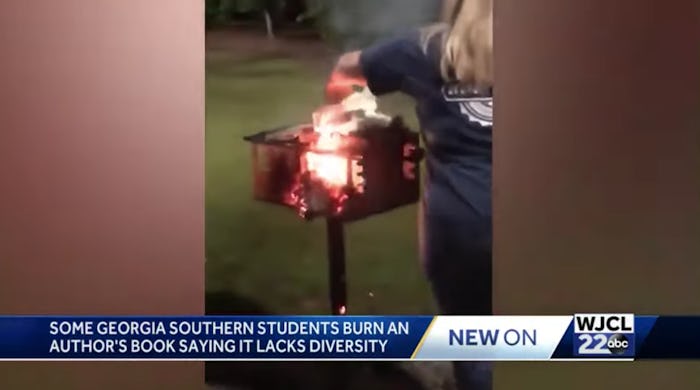News
After Latina Author Discussed White Privilege At College Q&A, Students Burned Her Book
Following a Q&A session with Jennine Capó Crucet, a New York Times contributor and associate professor at the University of Nebraska, a group of Georgia Southern University students burned the Latina author's book in response to her urging them to acknowledge and examine their white privilege.
On Wednesday, Crucet visited the Statesboro, Georgia university to talk about her novel, Make Your Home Among Strangers, with the school's first-year class as it's required reading for some freshmen classes, according to the university's newspaper, The George-Anne. Crucet's book, which was released in 2015, tells the story of the daughter of Cuban immigrants who's the first person in her family to graduate from high school. The book has won several awards, including the 2016 International Latino Book Award.
During the Q&A, as The George-Anne reported, one student reportedly said to Crucet: "I noticed that you made a lot of generalizations about the majority of white people being privileged. What makes you believe that it’s OK to come to a college campus, like this, when we are supposed to be promoting diversity on this campus, which is what we’re taught. I don’t understand what the purpose of this was."
"I came here because I was invited," Crucet reportedly responded, "and I talked about white privilege because it’s a real thing that you are actually benefiting from right now in even asking this question... What’s so heartbreaking for me and what is so difficult in this moment right now is to literally have read a talk about this exact moment happening and it’s happening again. That is why a different experience, the white experience, is centered in this talk."
Several students at Georgia Southern University, a predominately white college, apparently did not agree or simply did not understand message that white privilege still, in 2019, exists every single day.
One student who was required to go to Crucet's Q&Z told BuzzFeed News, "She came to our school and, the audience was predominantly white, and she came in and was attacking white people for an hour, putting all these stereotypes and generalizations on us. Like all white people are privileged and racist."
On Oct. 9, footage of students burning Crucet's book made its way on Twitter, and has quickly gone viral. "Disgusting," one person captioned the footage.
While Romper's request for comment from Georgia Southern University was not immediately returned, John Lester, Vice President for Strategic Communications and Marketing, told The George-Anne in a statement that "while it’s within the students’ First Amendment rights, book burning does not align with Georgia Southern’s values nor does it encourage the civil discourse and debate of ideas."
Crucet also released a lengthy statement on Twitter about what happened following her Q&A, confirming that a white student questioned her on whether she had the "authority to address issues of race and white privilege on campus."
"Her hostile reaction to my work closely mirrored the exchange that I recount in the essay itself," Crucet continued, referring to the reading she gave at the event. "It was very surreal and strange. I answered the question with the same response that I cite in the essay, and mentioned out loud that this moment felt like déjà vu."
Crucet added that her book "began as an act of love and an attempt at deeper understanding and she hopes the university "can act from the same place and work to affirm the humanity of those students who might understandably feel unsafe in the aftermath of the event and the book burning, and that the campus continues the difficult and necessary conversation that began in that auditorium."
Having open, honest, and respectful discussions about privilege is vital for progress, like what Crucet's Q&A attempted to do. It's nearly 2020, yet many still deny that white privilege exists. Although some students responded to such a discussion in a hostile way, Crucet shared on Twitter that there were fortunately many other "very amazing, brilliant students" who participated.
